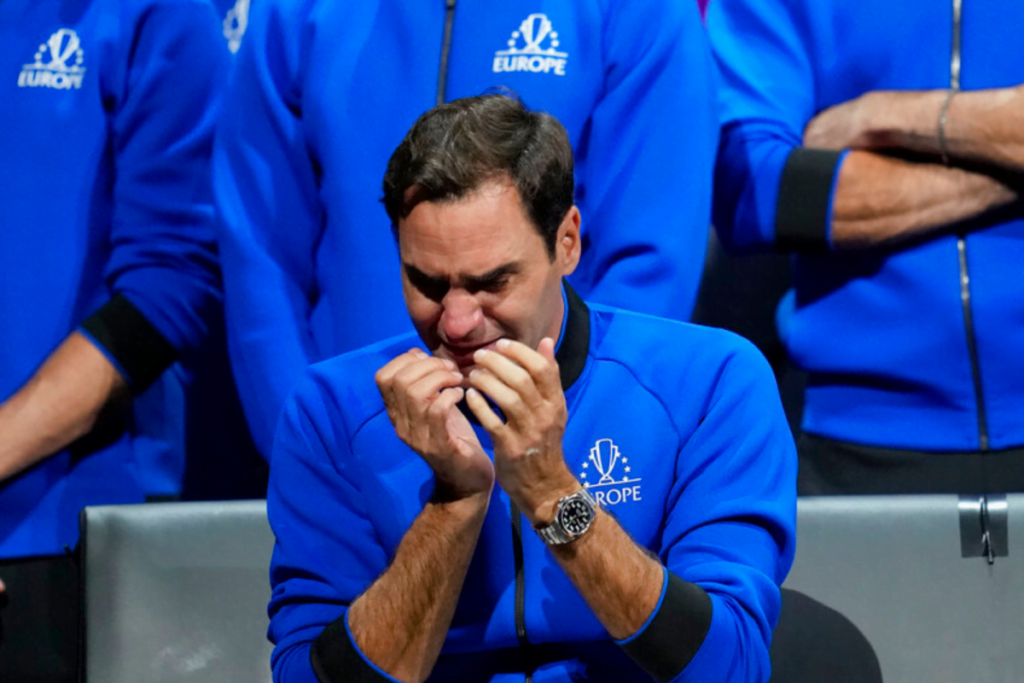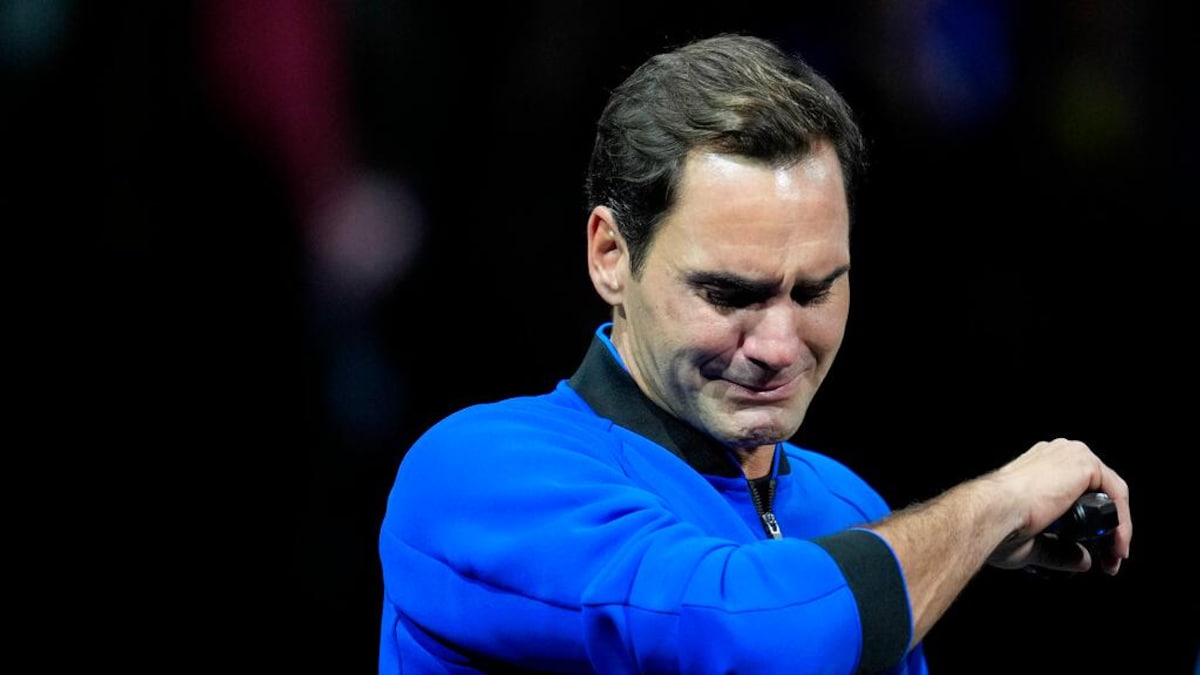Recently, legendary tennis player Roger Federer played his farewell match, which unquestionably was a momentous occasion for the sport, the player, the fraternity, and every other tennis fan.
Everyone, especially the icon and his competitor in tennis Rafael Nadal, had tears of joy in their eyes and they did not shy away from expressing their emotions. Even while the day stood out on its own, it spurred a crucial discussion about men and how they display emotional vulnerability.
If we take a closer look, such a reaction would appear entirely appropriate for a person who has dedicated his entire life to tennis and is regarded as a pioneer in the field.
However, the athlete’s emotional outbursts were highlighted and became a hot topic of discussion everywhere. This incident makes us question whether it is still forbidden for men to be sensitive and vulnerable.
Like women, men are also socialised to act in accordance with their gender starting at a very young age. They are meant to perform their gender when someone dismisses their emotions by saying things like “Boys must not cry like little girls,” and “Act like a man.” Although this may appear insignificant, it lays the foundation of gender roles in young, impressionable minds.
We are aware that acknowledging ‘pain‘ is the first step in dealing with it, and only then can we move on to further processing it. Boys, however, are typically expected to sweep this initial step of just expressing their pain under the carpet.
These emotionally repressed boys later grow up to be emotionally distant men who not only bear the weight of performing toxic masculinity themselves but also suffocate nearly every relationship they enter into.
Crying is frequently associated with a variety of emotions, such as sadness, fury, frustration, etc. It is generally believed to happen when one feels “powerless“. Maybe that’s why we call it “breaking down.” Therefore, the concept of ‘crying’ as a feminine behaviour arises from the fact that “power” is generally associated with men. Since “power” is defined as standing up like an oak in the face of adversity, men are socially expected do the same.
The traditional concept of masculinity is one that is quite rigid. The idea that “masculinity is like a glass, the moment you become vulnerable in front of anyone, it shatters and no matter how hard you try to piece it back together later on, one can never look at that man in the same way” came to me lately while listening to a podcast.
Also read: Naomi Osaka: Underlining That Every Athlete Is Only Human
The significance and acceptance of tears in men’s competitive sports seem quite counter-intuitive, uncommon, and startling, which is why this particular episode attracted so much attention. Since the dawn of athletics, athletes have been revered as “heroic figures of manhood“, idolised by many. This is so because we associate masculinity with things like ‘toughness, competition, aggression, and stoicism’, and these parameters fit well especially in the field of sports. Therefore, aggression and strength seem like more fitting responses given the relationship between men’s competitive sports and ‘masculinity’
Two of the men featured in it spoke about how men should always present themselves as a “mighty rock” in the eyes of everyone, especially their partner, because if they showed their vulnerability, they wouldn’t be viewed as the kind of man who is reliable and strong.
It is so constructed in our collective conscience that emotional vulnerability makes you “less of a man”, and everyone likes a “real man”. Though this idea is extremely problematic, it also illustrates how fragile the idea of “masculinity” is when it is threatened by the simple expression of “human emotion.” Men are reluctant to express themselves because they worry that doing so will somehow damage their reputation and interpersonal connections. Hence, they would rather suppress their emotions and let them all be pent up instead of acknowledging them.
What purpose does this masculinity serve by preventing men from experiencing the natural ups and downs of being human? Why don’t we as a society allow them to work through grief, sob uncontrollably, show vulnerability, and acknowledge their insecurities? What good is this notion of masculinity that forbids men from showing their partners their affection and from hugging their pals when they are at their weakest?
To be considered a “man” one must check off certain boxes which include having no breakdowns, vulnerabilities, or emotions, along with having a “heart of steel. If one does not fit into this stereotypical gender construct, then their “masculinity” is under scrutiny.

The significance and acceptance of tears in men’s competitive sports seem quite counter-intuitive, uncommon, and startling, which is why this particular episode attracted so much attention. Since the dawn of athletics, athletes have been revered as “heroic figures of manhood“, idolised by many.
This is so because we associate masculinity with things like ‘toughness, competition, aggression, and stoicism’, and these parameters fit well especially in the field of sports. Therefore, aggression and strength seem like more fitting responses given the relationship between men’s competitive sports and ‘masculinity’.
Numerous instances of female athletes experiencing emotional breakdowns have also been documented, but they were never reported in media headlines because crying is seen as normal behaviour for women. However, the way we regard gender and emotions appears to be changing, thanks to the individuals and social discourse of our times
This is why a conversation about the male expression of vulnerabilities becomes such a huge point of discourse at the time when such a celebrated man and sports icon broke down in front of the world. The sports star set a great example with his honesty because it will serve as an inspiration to others and show them that expressing oneself and being vulnerable does not make one “less of a man.”
However, this is not the first time that sportsmen have expressed their emotional truths during sporting events. For example, when Argentina won the “Copa American Cup” for the first time since 1933, the team was overcome with emotion, and legendary striker Lionel Messi was seen crying uncontrollably before making a video call to his wife and sharing his historic victory.
Similar emotional breakdowns were witnessed when Cristiano Ronaldo won the 2013 Ballon d’Or Award, as this was a momentous occasion for the Portuguese sensation, as all his effort and sacrifice had finally paid off.
Also read: The Perils & Price Of Performing Toxic Masculinity

Numerous instances of female athletes experiencing emotional breakdowns have also been documented, but they were never reported in media headlines because crying is seen as normal behaviour for women. However, the way we regard gender and emotions appears to be changing, thanks to the individuals and social discourse of our times.
It is such a delight to see that this generation is emancipating itself from these gender-specific norms and is willing to engage in challenging conversations. People are working to redefine gender roles and behaviours, and perhaps very soon we will reach a stage where “men crying” won’t make news headlines owing to its rarity.
Until then, events like these where men express their vulnerabilities are much-needed antidotes to toxic masculinity.




